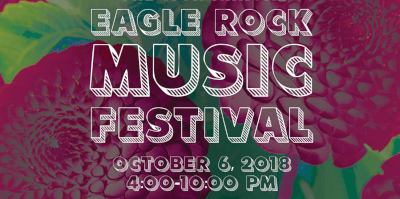Eagle Rock Music Festival‘s website claims that it is an event by locals, for locals — but community members have raised questions about the festival’s inclusion of bands specifically from Eagle Rock.
According to Matthew Himes, festival director, Eagle Rock Music Festival prioritizes local bands, but the festival defines local bands as any band from Northeast LA and surrounding areas, not just Eagle Rock. By this definition, local bands make up the majority of performers, according to Himes.
One Eagle Rock resident who has been repeatedly rejected from the festival is László Bolender. Bolender has lived in Eagle Rock for the last eight years, and opened his recording studio, Triangle Waves Records, in the neighborhood.
According to Bolender, he has attended the festival four or five times and his band has applied to play the festival every year since moving to Eagle Rock. However, the festival has never accepted them.
“No harm, no foul,” Bolender said. “It’s not going to stop us from making music or anything like that.”
But as for next year — he isn’t sure whether or not he will apply. He feels unmotivated based on past rejections, but still would like to play there someday if the opportunity presents itself.
“I do think there’s more potential for including more bands, and bands who happen to be more local. It seems to me that a lot of the bands that usually play are not necessarily from Eagle Rock,” Bolender said.
According to Himes, approximately 250–300 bands applied this year, and 40 were asked to play. About 90 percent of bands that performed went through that application process, but some more prestigious bands did not. This makes rejection a statistical reality.
In a Facebook post in the Eagle Rock Neighborhood Group with 15 comments and 88 likes, locals called for an increased inclusion of local Eagle Rock bands. The writer of that post was Dan Olivo, a jazz musician who played the festival in 2015 and 2016 but has been rejected every year since.
According to Olivo, what started out as a small grassroots festival has seemed to accept fewer local bands over time, to the point where some local bands he knows have stopped applying at all. Olivo has not attended the festival since he was last accepted in 2016.
20-year-old Ricky Parish, the drummer of the band Bad Press, started going to the festival in high school and has been going ever since. He said that he doesn’t agree with some community complaints about the festival’s expansion and neglect of local music over time.
“As far as I know, everything has kind of stayed the same and has the same great vibe that I’ve always loved,” Parish said.
Parish, who is from South Pasadena, said the competitive application process maintains the caliber of the festival.
According to Olivo’s Facebook post, “If you have a band and are from or currently live in Eagle Rock you should be able to participate in the festival every year. This can easily be resolved by having a locals stage designated for all Eagle Rock based bands that apply.”
Himes said the festival is not designed so that the same bands perform year after year, though bands can sometimes play consecutive years. There is no stage where, as Olivo suggested, all local bands that apply can play, but there is a stage designated for emerging local talent.
“We use the emerging local talent stage to give bands that are maybe starting out and looking for an opportunity to pick it up a step to perform in front of a much larger audience than they do normally,” Himes said.
Rounak Maiti ’16 played on that emerging local talent stage in 2014 with his band, Campus Security. Maiti’s band met and formed while the members were students at Occidental. According to Maiti, all the stages were representative of LA-based talent, even music styles that are sometimes overlooked.
“I think [the festival] did a good job balancing really cool out-of-town acts with some really solid in-town roots,” Maiti said.
According to Himes, the festival’s biggest challenge and strength is not creating a festival with the most local bands, but the most diverse bands.
“My biggest priority when I’m curating or booking bands, I definitely ask: How does this represent the diversity of everyone that is represented in LA?” Himes said.
According to Bolender, one barrier in the festival achieving a diverse applicant group from which to pull from is the application fee.
“I don’t mind paying it, it’s only 20 dollars, but I’m sure there are plenty of bands that the members just lost their job or cannot afford to,” Bolender said. “I think opening that up would hopefully make it a little better in the future, especially for local bands in Eagle Rock.”
According to Himes, he wants to hear constructive criticism, and he encourages locals to get involved as volunteers.
“Our doors are always open. If you have different perspectives that you feel like we maybe aren’t seeing or expressing or upholding, tell us so that we can do better,” Himes said. “It’s our 20-year anniversary next year, so we really want to go big next year, but we won’t be able to do it without the community.”
![]()




































